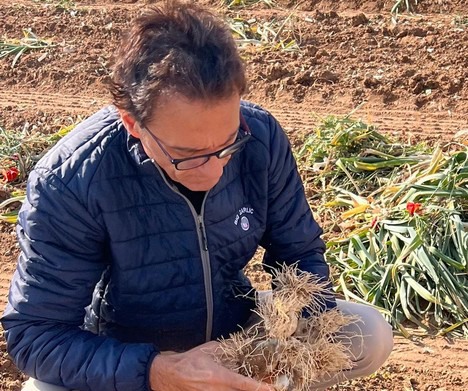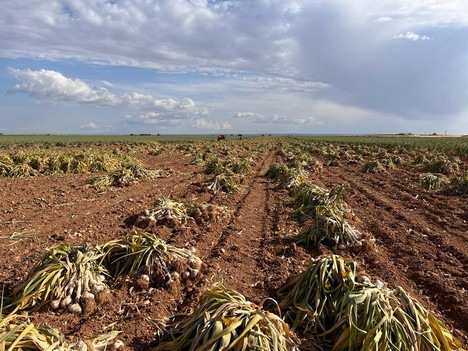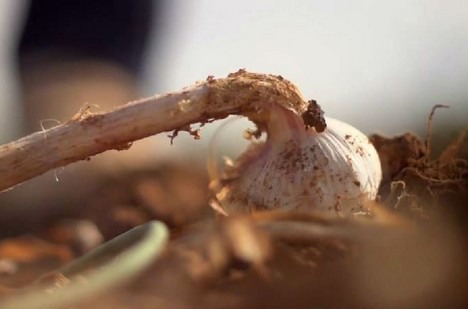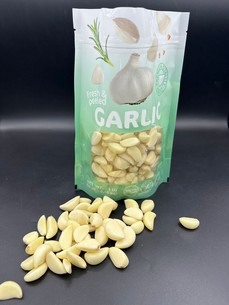Rainfall in the last three weeks in southern Spain has interrupted and affected part of the early spring garlic harvest. It is still early to make any global assessments, but the supply is expected to be reduced due to the losses caused by excess moisture.

"Due to the high production costs and difficulties in marketing the production, many growers had to reduce their acreage at the end of last season. Some even abandoned their crops," says Juan Carlos Navarro, general manager of Big Garlic.
"We estimate that the acreage devoted to garlic cultivation this year has been reduced by about 15% compared to the previous one. This season, the garlic produced has been of high quality and large sizes. When it comes to Spring garlic, the caliber of about 70% of the production exceeds the 60 mm. This circumstance made us optimistic about the harvest, since a higher yield per hectare could compensate for the reduction in the cultivated area," he says.

However, intermittent rains in recent weeks have been a hurdle for the sector's projections when the harvest was in full swing.
"In addition to hindering the harvesting tasks, the excess moisture has affected the garlic drying process. The Spanish garlic sector is highly professional and is making all the necessary efforts to try alleviating the consequences of such adverse weather conditions during the harvest. It is still early to make an assessment of the overall situation, but we know that part of the production will be affected to a greater or lesser extent. We won't know the extent of the damage until a few days after the rainfall is over, when we'll have the chance to finish our work with the Spring garlic, but there is clearly a lot of concern about it," said Juan Carlos Navarro.
These circumstances are putting the focus back on a sector that is not in a position to withstand another campaign with higher costs than sales prices.

"Fortunately, purple garlic has not been affected by the rains, because it is a later variety; in fact, the cool and humid climate has favored its growth. If it does not rain during the harvesting stage, we will obtain an excellent quality product and good calibers," said Juan Carlos Navarro.
"This season's prices in the international markets have yet to be set, but first impressions are that they will be higher than last season's. It should be noted that China has also seen a reduction in its production due to a smaller acreage and low yields per hectare. It appears that they were also partially affected by rains during the harvest. This leads us to think that there will be a lower global supply and better prices," says the general manager of Big Garlic.
Juan Carlos Navarro also mentions that while the Spanish fresh garlic sector is well protected in the European Union by an import license quota, and it is better protected from competition from other countries with lower production costs, this is not the case for processed garlic (dehydrated, frozen, etc.).
 "This kind of products enter Europe freely from any origin; a situation that makes it challenging for a European industrial garlic processing industry to develop. If measures such as those in place for the fresh production were implemented, there would be room for the development of a European sector that could pay better prices for damaged garlic to its growers, so that they would, in any case, manage to cover their production costs and not be threatened. It would be highly beneficial for a sector that is socially, economically and environmentally important for large areas with small populations," he says.
"This kind of products enter Europe freely from any origin; a situation that makes it challenging for a European industrial garlic processing industry to develop. If measures such as those in place for the fresh production were implemented, there would be room for the development of a European sector that could pay better prices for damaged garlic to its growers, so that they would, in any case, manage to cover their production costs and not be threatened. It would be highly beneficial for a sector that is socially, economically and environmentally important for large areas with small populations," he says.
 For more information:
For more information:
Juan Carlos Navarro
Big Garlic
T: +34 9654331 27
M: +34 609601654
jc@big-garlic.com
www.big-garlic.com
